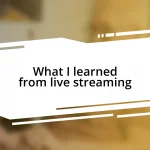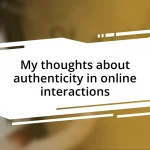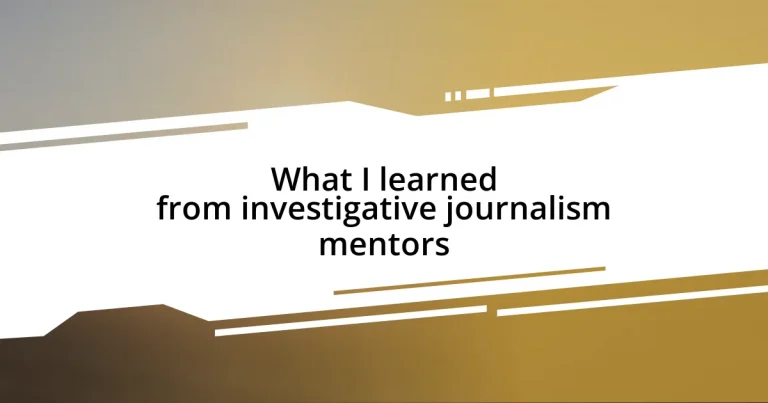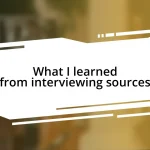Key takeaways:
- Investigative journalism requires in-depth research, persistence, and a commitment to exposing societal issues and injustices.
- Mentorship is essential for developing practical skills, providing emotional support, and fostering resilience in aspiring journalists.
- Key qualities of effective mentors include empathy, patience, and the ability to offer constructive feedback while encouraging growth.
- Ongoing self-reflection and networking are crucial for personal and professional growth, allowing journalists to continue evolving after formal mentorship ends.
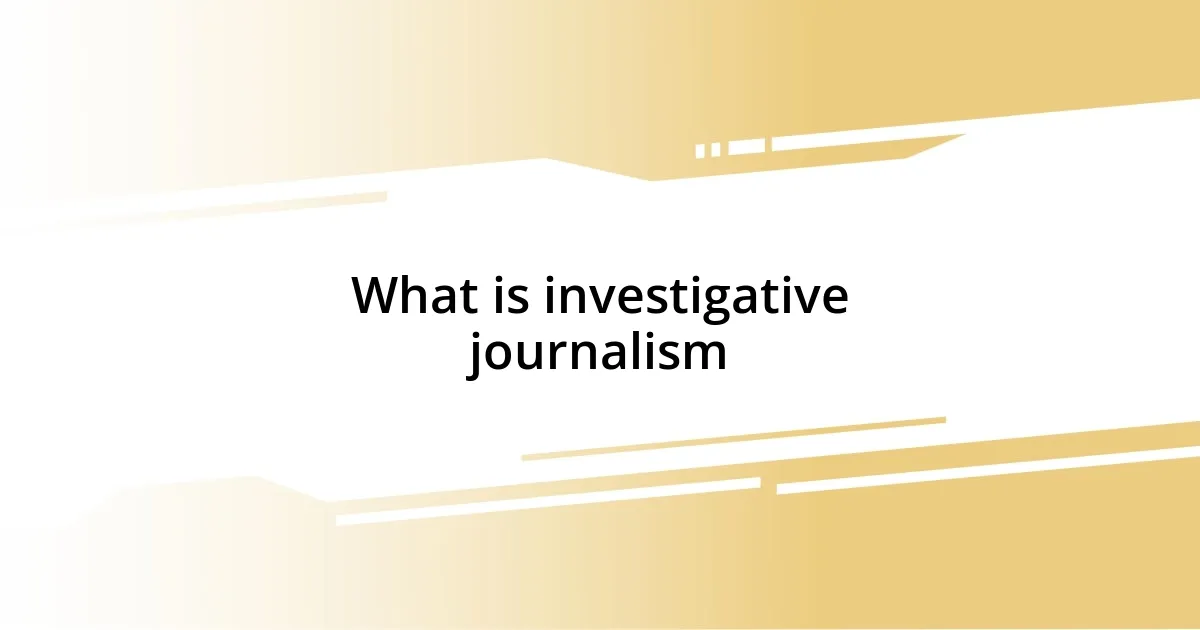
What is investigative journalism
Investigative journalism is a deep dive into complex stories that usually expose societal issues, corruption, or injustices. It goes beyond surface-level reporting, demanding persistence, thorough research, and often an unwavering commitment to uncovering the truth. I remember my first foray into this world; I was struck by the weight of responsibility that comes with revealing important stories. Isn’t it fascinating how one article can spark significant change?
At its core, investigative journalism is about asking the tough questions and holding powerful individuals accountable. It requires a specific skill set, including sharp analytical thinking and a knack for storytelling, which I honed through guided experiences with my mentors. Have you ever wondered how journalists uncover hidden truths? Through relentless pursuit and sometimes risking their safety to ensure the public remains informed.
Moreover, the emotional aspect of investigative journalism cannot be overlooked. I recall the exhilarating feeling of piecing together information that could potentially change lives. Each story brings with it a unique emotional journey, touching the lives of those involved and the audience at large. Isn’t it incredible how words can wield power that goes far beyond the pages?
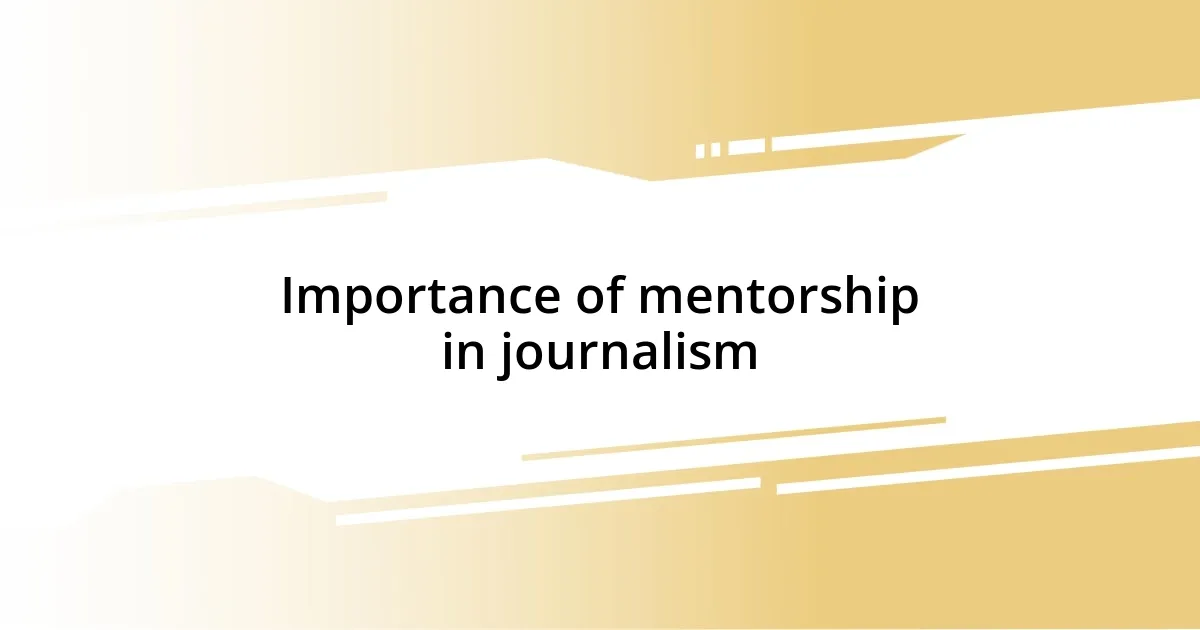
Importance of mentorship in journalism
Mentorship plays a pivotal role in shaping the future of journalism. I’ve found that having a mentor in this field can provide invaluable insights that simply can’t be gleaned from textbooks. I remember sitting down with my mentor over coffee, absorbing their stories of triumphs and setbacks. Each piece of advice felt like a compass, guiding me through the murky waters of complex narratives.
Further, mentors help cultivate essential skills like critical thinking and investigative techniques. I once shadowed a seasoned journalist while examining public records for a story. Their meticulous approach to detail opened my eyes to aspects of journalism I hadn’t considered before. This hands-on experience not only boosted my confidence but also instilled a sense of accountability in the work that I do—something I believe every aspiring journalist should grasp.
In addition to skills development, emotional support stands out as a critical component of mentorship. During tough reporting assignments, I often felt overwhelmed, but my mentor was always there to remind me that doubt is part of the process. Their reassurance helped me push through demanding situations, reinforcing the idea that mentorship goes beyond just teaching; it’s about building resilience and an understanding of one’s purpose in journalism.
| Aspect | Mentorship Benefits |
|---|---|
| Skill Development | Provides hands-on experience and practical knowledge through guidance. |
| Emotional Support | Offers encouragement during challenging assignments, strengthening resilience. |
| Networking | Facilitates connections in the industry, opening doors for future opportunities. |
| Accountability | Instills a sense of responsibility towards ethical journalism practices. |
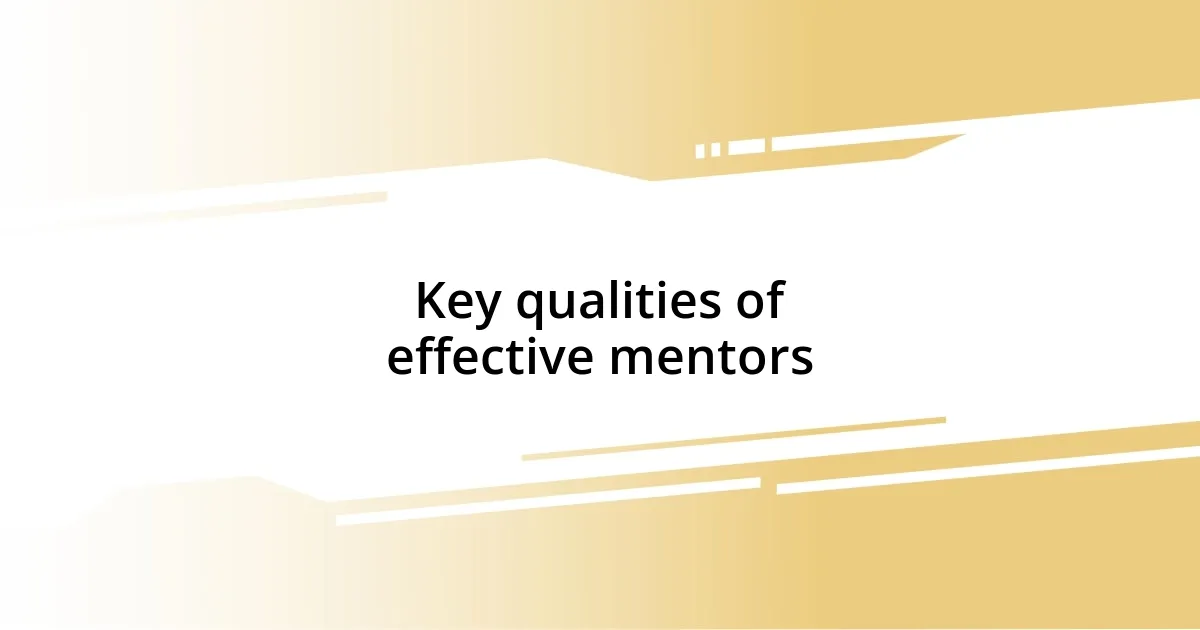
Key qualities of effective mentors
Effective mentors possess qualities that are invaluable in nurturing the next generation of investigative journalists. From my experience, the most impactful mentors are those who genuinely invest in their mentees’ growth. I recall one mentor who would regularly challenge me to think critically about my assumptions. This approach not only fostered my analytical skills but also helped me gain confidence in articulating my thoughts. It’s not merely about sharing knowledge; it’s about fostering an environment where questions are encouraged and welcomed.
Here are some key qualities that stand out in effective mentors:
- Empathy: Understanding the emotional challenges faced by students in a demanding field.
- Patience: Allowing mentees the time to grow and learn from their mistakes.
- Availability: Being present and approachable, ensuring that mentees feel supported.
- Constructive Feedback: Offering insights that help mentees learn without discouragement.
- Encouragement: Recognizing and celebrating small victories to boost confidence.
I remember another mentor who made it a point to celebrate each of my milestones—whether big or small. That simple act of recognition reinforced my passion for investigative journalism, reminding me that progress is made through perseverance and support. Each encounter I had with my mentors left me more equipped, not just in skills, but in my belief that I belong in this demanding yet rewarding field.
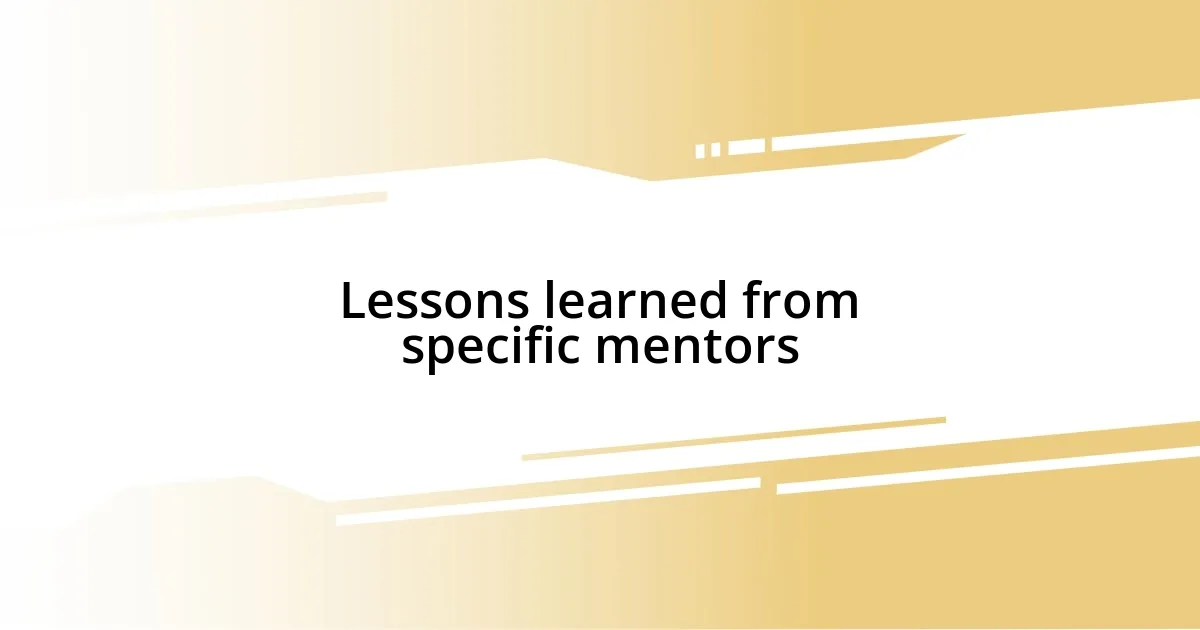
Lessons learned from specific mentors
I learned the importance of networking from a mentor who was incredibly well-connected in the journalism world. During a particularly challenging investigation, she urged me to reach out to sources I initially hesitated to contact. I remember feeling nervous, thinking, “What if they don’t want to talk to me?” But her encouragement transformed my apprehension into action. The connections I made not only enriched my story but also introduced me to a wonderful community of journalists who shared their experiences openly.
Another lesson that stands out is the value of ethical journalism, taught to me by a mentor who was unwavering in her principles. I recall a situation where I faced pressure to cut corners for a more sensational angle. She sat me down and emphasized, “It’s not just about the story; it’s about how you tell it.” That moment solidified my understanding that maintaining integrity is crucial in building trust with the audience. It made me question how I wanted to define my career and the impact I wanted to have.
Then there’s the mentor who taught me resilience through his own experiences. He once shared a harrowing story about a time he faced backlash for a piece he wrote. He spoke candidly about the sleepless nights filled with doubt, yet he persevered. “Doubt can be paralyzing,” he said. “But use it to drive your research deeper.” His candidness about vulnerability helped me realize that feelings of uncertainty are completely normal in this field, motivating me to embrace challenges rather than shy away from them.
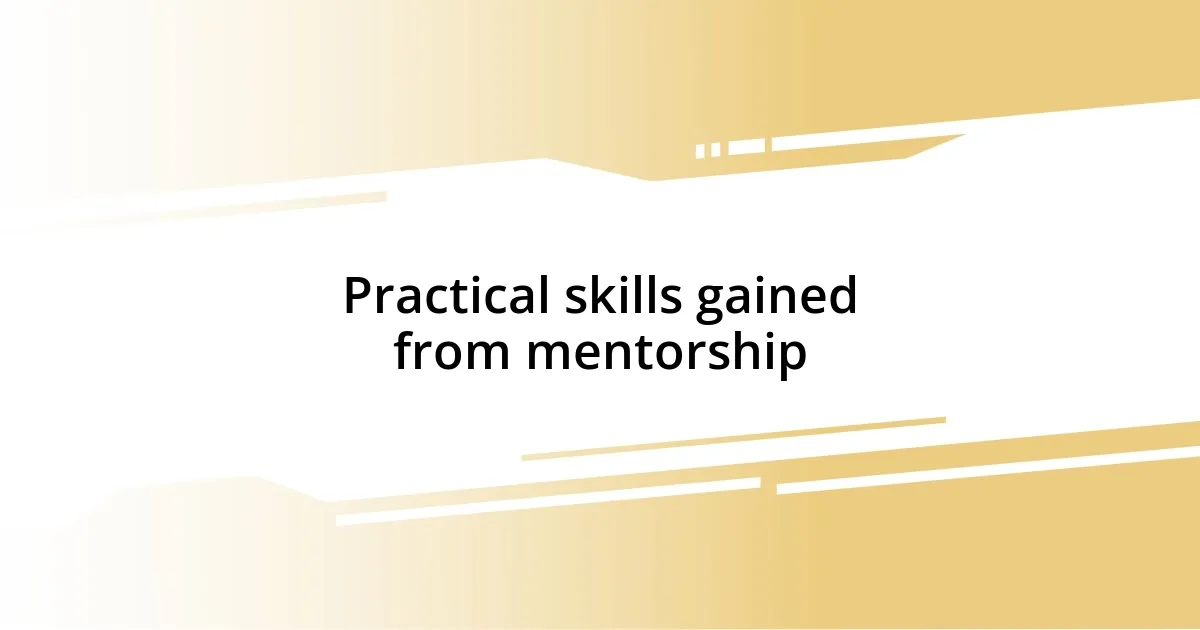
Practical skills gained from mentorship
The practical skills I gained through mentorship have been truly transformative. One of my mentors taught me the art of interviewing, stressing that it’s not just about asking questions but about listening actively. I vividly remember my first interview with a reluctant source. Thanks to my mentor’s guidance, I found the courage to show vulnerability and connect personally. It turned out to be a game changer—the source opened up, sharing insights I never would have gotten otherwise. Have you ever considered how much listening can unlock hidden stories?
Additionally, I learned the crucial skill of investigative research from a mentor who was meticulous about details. I recall a moment when I was puzzled over conflicting data in a story I was working on. He advised me to take a step back and approach the information like a puzzle. Armed with that mindset, I delved deeper, and to my surprise, I uncovered a critical piece of evidence that reshaped my entire narrative. It’s incredible how mentorship can help foster such analytical thinking, don’t you think?
Finally, my mentors taught me the importance of clear and concise writing. One mentor, in particular, would often challenge me to rewrite my drafts, encouraging me to eliminate jargon and express my ideas plainly. After countless revisions, I finally submitted a piece that was not only polished but resonated with readers. It’s fascinating how the right guidance can help refine our communication skills. Have you ever struggled to convey your ideas, only to realize how impactful simplicity can be?
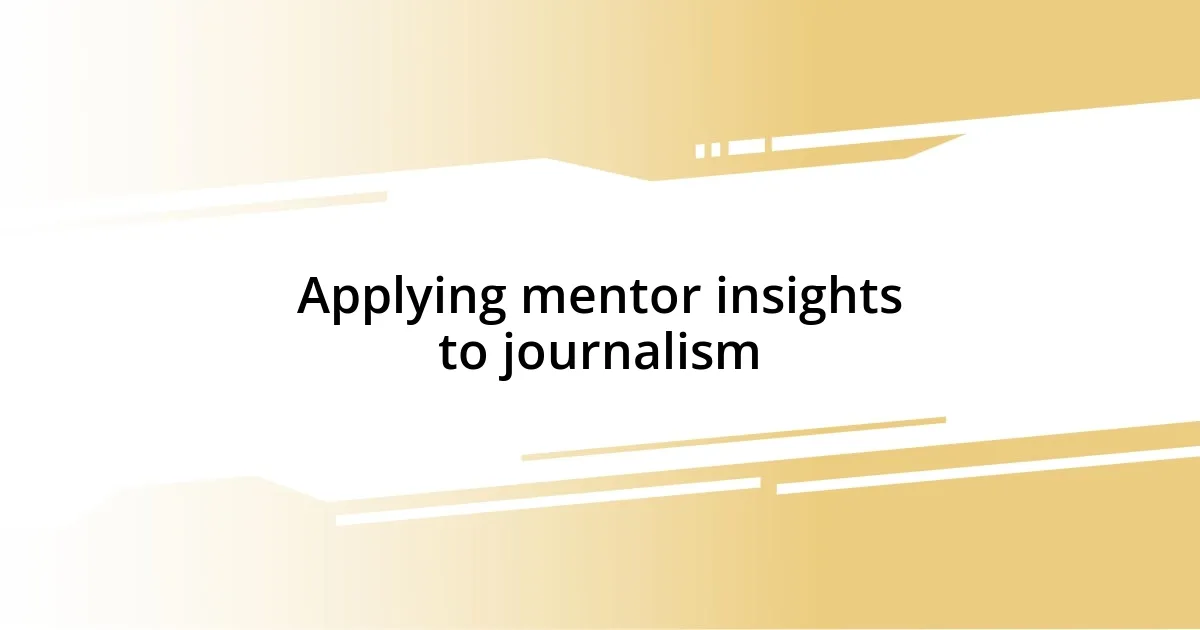
Applying mentor insights to journalism
When applying the insights gained from mentorship to my journalism journey, I often recall the advice my mentor gave me about embracing my unique voice. During one of our brainstorming sessions, she pointed out that authenticity resonates more with readers than trying to fit into any preconceived mold. It was an eye-opener. I started writing from my perspective, which not only made the stories feel more genuine but also allowed my passion for the subject to shine through. Have you ever found that being true to yourself elevates your work?
Another area where mentor insights proved invaluable was in the art of storytelling. I remember a mentor encouraging me to think of each piece as a narrative arc, rather than just a collection of facts. One day, he challenged me to reframe a dry report into a compelling story. As I transformed the data into an engaging narrative that followed a clear journey, I felt a sense of connection with my audience that I had previously overlooked. Isn’t it interesting how we can captivate our readers by weaving facts into relatable stories?
Lastly, the invaluable lesson of adaptability really struck a chord with me. A mentor once shared an experience where he had to pivot his approach mid-investigation due to mounting obstacles. Observing his ability to remain flexible taught me to embrace the unexpected and to see each challenge as a stepping stone rather than a setback. I still remember overcoming my own hurdles by staying open to new angles and adapting my strategy accordingly. How often do we underestimate the power of adjusting our approach in journalism?
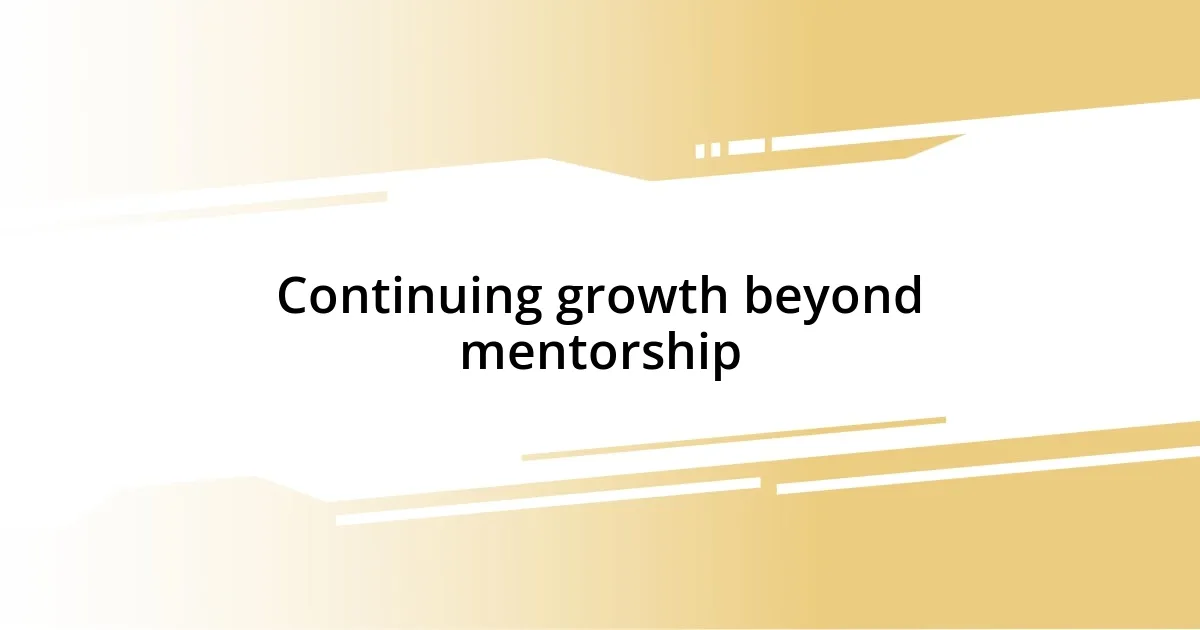
Continuing growth beyond mentorship
Continuing to grow beyond mentorship involves taking initiative and seeking knowledge independently. After my formal mentorship ended, I felt a mix of vulnerability and excitement. I vividly recall diving into new investigations that challenged my skills, using what I learned to navigate uncharted waters. It was empowering to realize that the learning didn’t stop; I had the tools to keep evolving on my own. Have you ever found that stepping outside your comfort zone leads to surprising growth?
Self-reflection has become a cornerstone of my ongoing development. I started dedicating time each month to review my past projects, analyzing what worked and what didn’t. There was one project that initially flopped, but as I examined my process, I unearthed valuable lessons about audience engagement. Reflecting on both successes and failures helps solidify those mentor teachings while revealing new paths for improvement. Have you tried stepping back to assess your work; it can be eye-opening!
Networking has played an essential role as well. Moving forward, I made a conscious effort to connect with other journalists. One casual meet-up turned into an invitation to collaborate on an investigative piece. I learned so much through those interactions and exchanges of ideas. The dialogues with fellow professionals continue to inspire me to push boundaries and remain curious. How has building a community affected your growth?



